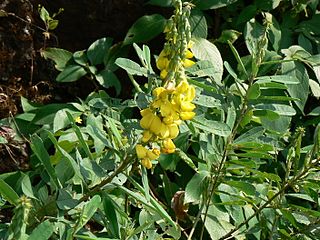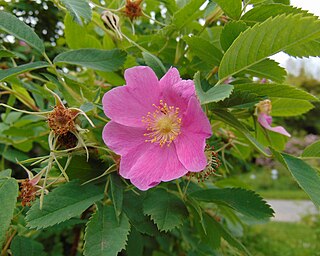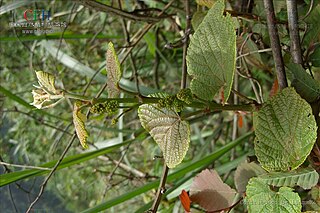
Triadenum, known as marsh St. John's worts, is a small genus of flowering plants in the family Hypericaceae. The genus is characterized by opposite, blunt-tipped leaves and pink flowers with 9 stamens. They are distributed in North America and eastern Asia.

Elsholtzia ciliata, commonly known as Vietnamese balm, xiang ru (香薷) or kinh giới in Vietnamese, is a plant native to Asia. In the US, it is commonly known as Crested Late Summer Mint. In US Vietnamese grocery stores, it is called Kinh Gioi, Vietnamese Lemon Balm, or Vietnamese Lemon Mint.
Alseodaphnopsis rugosa is a species of plant in the family Lauraceae. It is native to southeastern Yunnan province of China and northern Vietnam. It grows in mixed forests in valleys. It is threatened by habitat loss.
Begonia cavaleriei is a species of plant in the family Begoniaceae. It is endemic to China. It grows on limestone rocks.
Begonia hainanensis is a species of plant in the family Begoniaceae. It is endemic to China. It grows in forests and on mossy rocks.
Begonia peltatifolia is a species of plant in the family Begoniaceae. It is endemic to China. It grows on limestone rocks and broad-leaved forests.
Goniostemma punctatum is a species of plant in the family Apocynaceae. It is endemic to China. It grows in montane forests.
Flora of China is a scientific publication aimed at describing the plants native to China.

Hygroryza (watergrass) is a monotyipic genus of Asian flowering plants in the grass family. The only known species is Hygroryza aristata, native to China, Bangladesh, Cambodia, India, Laos, Malaysia, Myanmar, Nepal, Pakistan, Sri Lanka, Thailand, Vietnam.

Najas gracillima, the slender waternymph, is a submerged species of aquatic plant in the Hydrocharitaceae family. found in lakes and streams. It is native to China, Russian Far East, Japan, Korea, Taiwan, Iran, Alberta, Ontario, Newfoundland, Nova Scotia, New Brunswick, the eastern United States. It is also considered introduced and naturalized in France, Spain, Italy and California.
Siphocranion is a genus of plants in the family Lamiaceae, first described in 1929. It is native to China, the Himalayas, and northern Indochina.

Hypericum lancasteri, known as Lancaster's St. John's wort or as zhan e jin si tao in Chinese, is a species of flowering plant in the St. John's wort family Hypericaceae. The species has been awarded the Royal Horticultural Society's Award of Garden Merit.
Actinocarya is a small genus of annual herbs in the family Boraginaceae. Species in the genus are found in Pakistan, China, and India.

Crotalaria spectabilis, the showy rattlebox or showy rattlepod, is a species of flowering plant in the pea family Fabaceae. It is native to the Indian Subcontinent, southern China, and Southeast Asia. It is a perennial herb that grows up to 0.6–1.5 m (24–59 in) tall. It grows in montane grasslands. It was introduced to most of the world's tropics and subtropics and is now a serious agricultural pest species. It is toxic to livestock, causing liver damage.

Rosa webbiana, occasionally called Webb's rose, wild rose, or thorny rose, is a widely distributed species of flowering plant in the family Rosaceae. It is native to Central Asia, Tibet and Xinjiang in China, Afghanistan, Pakistan, the western Himalayas, and Nepal. It grows in scrub, grassy places, valleys, and slopes. A diploid, its chromosome count is 2n = 2x = 14.

Vitis wilsoniae is a vining plant in the grape family native to China. It is commonly known as the net veined grape or reticulated grape. This species can be found in the provinces of Anhui, Chongqing, Fujian, Gansu, Guizhou, Henan, Hubei, Hunan, Shaanxi, Sichuan, Yunnan, and Zhejiang. The plant grows at altitudes of 400-2000m.

Vitis bellula, commonly known as the beautiful grape or small leaf hair grape, is a Chinese liana in the grape family. It is native to the provinces of Guangdong, Guangxi, Hubei, Hunan, and Sichuan. The plant grows at elevations of 400–1,600 m (1,300–5,200 ft) and bears medium-sized purplish-black grapes.
Erysimum deflexum, the bent treacle mustard, is a herbaceous plant, a member of the family Brassicaceae.
Ribes burejense, sometimes known as the Bureja gooseberry, is a species of flowering plant in the currant/gooseberry family Grossulariacea, generally regarded as closely related to Ribes aciculare.

Wrightia arborea, the woolly dyeing rosebay, is a species of flowering plant in the family Apocynaceae. It is native to the Indian Subcontinent, Southeast Asia, and southern China. A tree reaching 20 m (66 ft), local peoples use it for timber and as the source of a dye.









